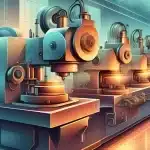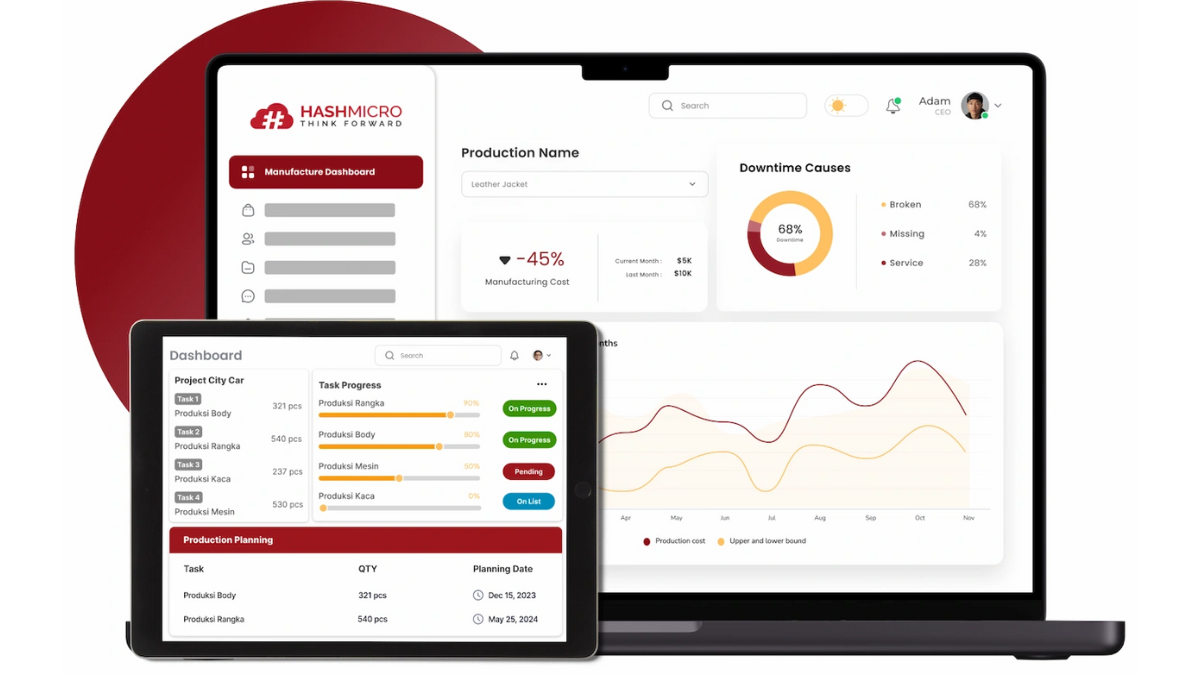The future of manufacturing is all about smart technologies that boost precision, efficiency, and flexibility in operations. For managers, this shift opens exciting doors to innovate and streamline processes like never before.
Yet, challenges such as managing complex supply chains, minimizing downtime, and maintaining quality under pressure remain top concerns. Without the right tools, these obstacles can seriously affect overall performance and growth.
Recent research shows the Philippine manufacturing sector is ready for expansion but still faces hurdles like slow digital adoption and energy inefficiencies. Embracing modern manufacturing systems is essential to unlock this promising potential.
Keep reading to explore what modern manufacturing really means and how tailored software solutions can empower your business to overcome these challenges. Let’s uncover practical strategies that can take your manufacturing operations to the next level.
Table of Contents

Key Takeaways
|
What is Modern Manufacturing?
Modern manufacturing is a cleaner, leaner, and greener industry that uses advanced technologies like computer-aided machines and progressive software. This shift allows companies to focus on innovation, precision, and quality instead of heavy manual labor.
Modern manufacturing systems rely on teamwork and creativity, where professionals use digital blueprints and design MRP software to bring ideas to life. This manufacturing strategy combines problem-solving and technical skills to produce high-quality products efficiently.
Success in modern manufacturing requires knowledge, critical thinking, and specialized skills, making it a highly sought-after career path. With these skills, workers contribute to a dynamic industry that drives economic growth and offers rewarding opportunities.
Key Components of Modern Manufacturing
Transitioning to Industry 4.0 involves adopting several essential elements tailored to a company’s unique needs. While every manufacturer’s journey differs, these key components form the backbone of effective manufacturing systems.
Understanding and implementing these will strengthen your modern manufacturing strategy and position your business for long-term success.
1. Artificial Intelligence (AI) implementation
AI plays a pivotal role in modern manufacturing by enabling data-driven decision-making that optimizes production processes and workflows. From predictive maintenance that detects equipment failures before they disrupt operations to real-time quality control via machine vision, AI helps manufacturers minimize downtime and defects.
It also improves supply chain management by optimizing logistics and reducing inefficiencies, which contributes to lowering costs and energy consumption. Embracing AI within your modern manufacturing technologies ensures that your operations remain efficient, sustainable, and competitive in a rapidly evolving market.
2. Generative AI
Generative AI is revolutionizing modern manufacturing by going beyond optimization to foster innovation and creativity. It accelerates design iterations and prototyping, allowing companies, such as those in automotive or pharmaceuticals, to simulate complex scenarios and develop new products faster.
Additionally, generative AI enhances supply chain planning by predicting disruptions and balancing trade-offs between cost, speed, and sustainability. Integrating generative AI into your manufacturing strategy empowers your business to innovate continuously while reducing time-to-market and costs.
3. Blockchain technology
Although not always front and center in Industry 4.0 discussions, blockchain technology significantly enhances transparency and traceability within modern manufacturing systems. It securely records every step of the production process, ensuring product authenticity and enabling precise provenance tracking, critical for quality assurance and regulatory compliance.
Blockchain also facilitates smart contracts that automate vendor payments and reduces administrative burdens, while supporting sustainability efforts by tracking carbon credits and sustainable sourcing. Incorporating blockchain helps build trust with customers and partners, reinforcing your commitment to transparency and environmental responsibility.
These components highlight how manufacturing is no longer about just machinery but a sophisticated integration of technologies and strategies. By adopting AI, generative AI, and blockchain thoughtfully, your business can leverage the full potential of what modern manufacturing offers, higher efficiency, innovation, and sustainable growth.
From Traditional Manufacturing to Modern Manufacturing
Traditional manufacturing relied heavily on manual labor, basic machinery, and repetitive processes that often lacked flexibility and efficiency. Modern manufacturing, however, integrates cutting-edge technologies and sophisticated systems that enhance precision, speed, and adaptability, marking a transformative shift in production.
The rise of modern manufacturing technologies such as automation, AI, and IoT has redefined how products are designed, produced, and delivered. These innovations form the foundation of a manufacturing strategy focused on reducing waste, improving quality, and responding quickly to market demands.
Modern manufacturing systems emphasize collaboration between humans and machines, leveraging data-driven insights to optimize every stage of the production cycle. Understanding what manufacturing means and embracing these advanced tools and approaches is key to remaining competitive and sustainable in today’s dynamic business environment.

Key milestones in the evolution of modern manufacturing
- 2004: The emergence of IoT (Internet of Things) in industrial settings paved the way for smart factories and connected devices, a cornerstone of modern manufacturing technologies.
- 2010: Germany’s High-Tech Strategy 2020 popularized Industry 4.0, formally defining the roadmap toward digitalized manufacturing systems.
- 2014: The Industrial Internet Consortium (IIC) was launched to promote widespread adoption of IoT solutions across manufacturing sectors globally.
- 2016: Breakthroughs in 3D printing introduced additive manufacturing into mainstream industrial use, revolutionizing prototyping and production methods.
- 2019: Blockchain solutions began enhancing supply chain transparency and manufacturing integrity, addressing critical challenges in trust and traceability.
- 2020: The COVID-19 pandemic accelerated remote operations and automation, compelling manufacturers to adopt more resilient and flexible manufacturing strategies.
- 2022: The introduction of EU ESG norms mandated companies to report CO2 emissions across supply chains, driving advanced tracking and sustainability reporting solutions.
- 2023: Generative AI expanded its role in manufacturing by enhancing product design, predictive analytics, and customer personalization.
- 2024: Early breakthroughs in quantum computing prototypes hinted at new potentials for optimization in manufacturing processes, promising a future leap in efficiency.
These milestones highlight the dynamic journey from traditional to modern manufacturing and showcase how evolving technologies and strategic initiatives continue to shape the industry’s future.
Benefits of Modern Manufacturing
Understanding the benefits of manufacturing software is crucial for businesses aiming to stay competitive and efficient in today’s fast-evolving market. By leveraging modern manufacturing technologies and systems, companies can unlock greater productivity, quality, and sustainability, driving long-term success.
- Increased efficiency and productivity: Modern manufacturing technologies streamline production processes by automating repetitive tasks and optimizing workflows. This efficiency boost allows businesses to produce higher-quality goods faster, aligning perfectly with an effective manufacturing strategy.
- Enhanced product quality and consistency: Advanced modern manufacturing systems use precise machinery and real-time monitoring to reduce defects and ensure uniformity. This results in superior product quality that meets customer expectations consistently, strengthening brand reputation.
- Greater flexibility and customization: Modern manufacturing enables companies to quickly adapt to changing market demands and customize products with ease. Through digital tools and smart automation, businesses can implement flexible manufacturing strategies that improve responsiveness and competitiveness.
- Improved sustainability and reduced waste: One of the key benefits of modern manufacturing is its focus on sustainability through optimized resource use and waste reduction. Leveraging data-driven technologies, manufacturers can minimize environmental impact while maintaining profitability.
- Stronger supply chain integration: Modern manufacturing systems enhance transparency and coordination across supply chains using technologies like IoT and blockchain. This integration reduces delays and inefficiencies, supporting a more resilient and agile production network.
- Empowered workforce and innovation: Modern manufacturing fosters a collaborative environment where skilled workers leverage technology to solve problems creatively. By embracing it, companies cultivate innovation that drives continuous improvement and growth.
Implement Modern Manufacturing Seamlessly with HashMicro Software
Why we picked it: HashMicro Modern Manufacturing Software is ideal for businesses aiming to streamline production processes, enhance operational efficiency, and support scalable growth.
The system provides advanced manufacturing management tools that promote real-time monitoring, data-driven decision-making, and optimized workflows, enabling companies to excel in today’s competitive landscape.
HashMicro Modern Manufacturing Software is designed to help businesses improve productivity and quality by automating key manufacturing functions and providing actionable insights. It integrates seamlessly with existing systems to support a comprehensive modern manufacturing strategy focused on precision, agility, and sustainability.
If you’re interested in exploring this solution, HashMicro offers a free demo that demonstrates how its manufacturing software enhances production management and supports end-to-end manufacturing operations.
Below are key features of HashMicro Modern Manufacturing Software that can help optimize your manufacturing systems:
- Manufacturing Production Scheduling: By forecasting demand and visualizing schedules through interactive graphs, manufacturers can optimize production plans, leading to reduced delays and better resource utilization.
- Manufacturing Quality Control: Automated monitoring detects defects early, enabling consistent product quality and minimizing costly rework or returns.
- OEE Tracking (Overall Equipment Effectiveness): Tracking equipment performance in real-time helps identify inefficiencies, which increases machine uptime and overall productivity.
- Real-Time Stock Input and Output for Production: Instant inventory updates allow accurate material availability checks, preventing production stoppages and reducing excess stock.
- Comprehensive BoM, Routing, Work Orders, and Production Records Management: Centralized management of production components and workflows streamlines operations, improving accuracy and traceability.
- Manufacturing Gantt Chart Schedule Management: Visual scheduling clarifies task dependencies and timelines, enhancing coordination and timely delivery of products.
- Manufacturing Requisition Planning: Automating material requests based on production plans ensures timely procurement, avoiding stock shortages and production delays.
- Manufacturing Cost Actualization: Continuous tracking of costs provides insight into spending patterns, enabling better budgeting and increased profitability.
- Finished Goods Production Simulation: Simulating production processes before execution helps identify bottlenecks, resulting in smoother operations and higher output.
- Conveyor Belt Sensor IoT Integration: IoT sensors monitor equipment health in real time, allowing predictive maintenance that reduces unexpected downtime.
Additionally, HashMicro Manufacturing Software offers extensive customization and seamless integration capabilities, making it adaptable to your business’s specific needs. Together, these features support a robust manufacturing strategy that drives efficiency, innovation, and competitive advantage.
Conclusion
Modern manufacturing represents a transformative shift that leverages advanced manufacturing technologies and smart systems to enhance efficiency, quality, and sustainability. Embracing these innovations enables businesses to stay competitive and responsive in a rapidly evolving industrial landscape.
To effectively implement modern manufacturing technologies like AI and automation, HashMicro Manufacturing Software offers a comprehensive solution that streamlines production, optimizes resource management, and improves real-time decision-making. By adopting HashMicro, businesses gain a powerful tool to enhance product quality, reduce costs, and stay agile in meeting market demands.
Take the next step in modernizing your manufacturing operations by signing up for a free demo of HashMicro Manufacturing Software and see how it can drive innovation, improve efficiency, and build resilient supply chains.
























